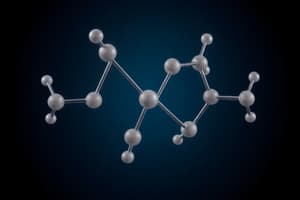Podcast
Questions and Answers
What is catenation and how does it relate to the unique properties of carbon?
What is catenation and how does it relate to the unique properties of carbon?
Catenation is the ability of an element, particularly carbon, to form covalent bonds with other atoms of the same element. This results in the formation of long chains or rings of atoms. The unique property of catenation in carbon allows it to form diverse and complex organic molecules, contributing to the vastness and complexity of organic chemistry.
Why is carbon tetravalent and what is the significance of this property in organic chemistry?
Why is carbon tetravalent and what is the significance of this property in organic chemistry?
Carbon is tetravalent because it has 4 valence electrons, allowing it to form 4 covalent bonds with other atoms. This property is significant in organic chemistry as it enables carbon to form stable and diverse compounds, leading to the vast array of organic molecules found in nature and synthesized in the laboratory.
What is the IUPAC system of nomenclature and why is it important in organic chemistry?
What is the IUPAC system of nomenclature and why is it important in organic chemistry?
The IUPAC system of nomenclature is a set of rules used to systematically name organic compounds based on their structure. It is important in organic chemistry as it provides a standardized and universal method for naming organic molecules, facilitating clear communication and understanding among chemists worldwide.
Explain the concept of organic reaction mechanism and its significance in understanding organic chemistry.
Explain the concept of organic reaction mechanism and its significance in understanding organic chemistry.
What are the techniques used for the purification of organic compounds and why is purification important in organic chemistry?
What are the techniques used for the purification of organic compounds and why is purification important in organic chemistry?
Flashcards are hidden until you start studying




